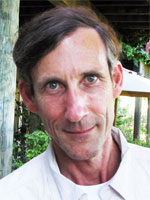SCIFOO 2007
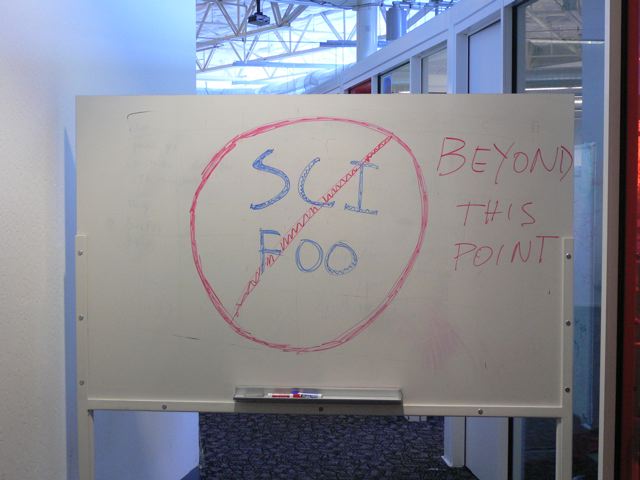
Security
(GEORGE DYSON:) The impossible choice at SciFoo is whether to attend sessions on people and subjects you know, or sessions on people and subjects you don't know anything about. It's a lot like going to a new restaurant—for 11 meals in a row. Do you want to see how "Quantum Computing" is served here (well-done, by Frank Wilczek) or do want to sample something you have never seen on the menu before?
The session that left me most impressed was a subject I've heard discussed many times: "Asteroid and Near-Earth-Object Defense", presented by Pete Worden, now director of NASA Ames. Worden, whose multiple careers within the Air Force, Capitol Hill, and now NASA, gives him a unique perspective on how, both politically and technically, we might actually get something done, outlined a refreshingly realistic plan (off the record!) for manned exploration missions to nearby asteroids using existing space vehicles, and, better yet, a vision for super-low-cost unmanned reconnaissance of near-earth objects using repurposed micro-satellites that were originally developed for "Star Wars" defense. His solution is obvious, both for science and global security: the sooner we get in the habit of landing on things that approach earth closely, the better we will understand them and the less likely we are to get caught by one unawares.
Every hour there was at least one session I wished I could have attended, but the one I will single out here is "Give us your Data! Google's effort to archive and distribute the world's scientific datasets" by Noel Gorelick (formerly of NASA and now at Google). For a conference on the future of biology, technology, and science, meeting at Google's global headquarters, this was a rare session that focused explicitly on how Google is changing the landscape. Rather, Google now is the landscape, and the success of SciFoo offers ample demonstration of that.
Many Edge contributors and/or event participants were in attendance, including Larry Brilliant. Sergey Brin, Philip Campbell, Geoff Carr , George Church, Chris DiBona, Carl Djerassi, Eric Drexler , Esther Dyson, Freeman Dyson, Danny Hillis, Steve Jurvetson, Dean Kamen, Vinod Khosla, Jaron Lanier, Oliver Morton, PZ Myers, Tim O'Reilly, Larry Page, David Pescovitz, Stuart Pimm, Martin Rees, Michael Shermer, Clay Shirky, Charles Simonyi, Lee Smolin, Linda Stone, Yossi Vardi, Frank Wilczek, and Anne Wojcicki.
Who was missing? A long list, but here's one suggestion: Mark Hofer (science teacher and internship program leader at Blue Origin, Seattle) and about 12 high school or undergraduate students of his choice.
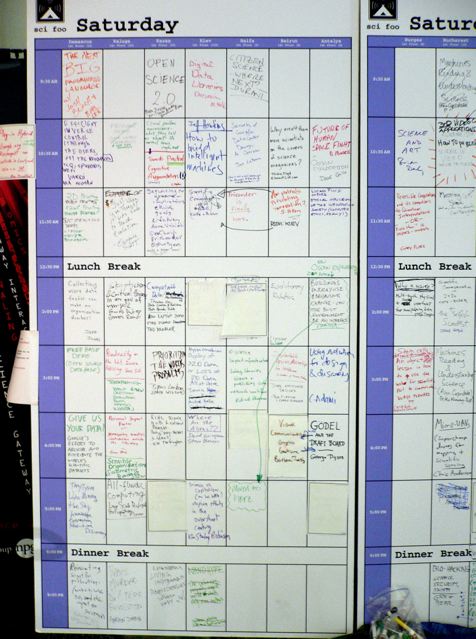
Schedule Board
(STEVE JURVETSON:) There is no predefined agenda; instead attendees collaboratively create one during the first evening of the event.
Right now, I am listening to a discussion of entropy and the mathematics of time by Lee Smolin, Jaron Lanier and Neal Stephenson…
So many cool but concurrent sessions… I’m open to your votes on which ones to attend…
Saturday, August 4th
09:30
1.The Next Big Programming Language Josh Block & Bob Lee
2.Open Science 2.0 BoraZivkovic
3.Digital Data Libraries Mike Halle
4.Citizen Science - Where Next? John Durant
5.Future of Healthcare Richard Satava
6.Visual Garage - We'll Fix Your Graphs and Visuals Felice Frankel
7.Quantum Computing - What, Why, How Frank Wilczek
8.Synthesizing Life Steve Benner
10:30
1.Efficient Inverse Control: Through the Users Not the Resources Wefi Vardi aka Neuman
2.Clinical Problems in Neuroscience / Towards Practical Cognitive Augmentation Vaughn Bell / Towards Practical Cognitive Augmentataion Ed Boyden
3.How to Build Intelligent Machines Jeff Hawkins
4.Why aren't there more Scientists on the Covers of Magazines Jackie Floyd
5.Future of Human Space Flight and Ocean Exploration D Mindell
6.Science and Art Brian Derbey
7.3D Video Applications: How to Publish Science in Video Steve Silverman
8.The Nature of Time and Mathematics Jaren Lanier & Neal Stephenson & Lee Smolin
9.Alternate terms of Science Education
10.Future History of Biology Rob Carlson
11.Human Cell and Regeneration Map or is it worth building a cellular resolution database for the whole human body? Ahila Csordas
11:30
1.3D Printing / Robot Printing / Food Printing / Printer Printing Lipson, Olliver, Bonabeau
2.Just When You Thought It Was Safe to Teach Evolution Eugeinee Scott
3.Sequencing the Genome: Implications, Ethics, Goals Linda Avery, Steve Benner
4.Are Patents Preventing Innovation? S Patton
5.Tricoder is Finally Here
6.Ethical Implications of the Information Society Luciano Floridi
7.Reversible Computation and Its Connections to Quantum Interpretations Gary Flace
8.Mapping Science and Other Big Networks Carl Bergstrom
9.A Magician Looks at the Irrational and Pseudo-Science James Randi
10.Listening to the World: Voices from the Blue Deep Chris Clark
14:00
1.Collecting More Data Faster Can Make an Organization Dumber Jeff Jonas
2.Skepticism and Critical Thinking in an Age of Marvels Guido Nurez
3.Computable Data/Mathematics Theodore Gray
4.$100 Laptop Demo Ted Koehler
5.Where Are the Aliens? David Grinspoon
6.The Selfish Scientist
7.Evolutionary Robotics
8.Buildings, Energy Use and Behavior Change - Can the Built Environment be an Interface?
9.Why a Mouse?: Multi-touch, Physical and Social Interfaces for Manipulating Data
10.Scientific Communication in 2030
11.Universe or Multiverse?
12.Reuse of Sewage to Grow Food and Provide Sanitation
13.Is Collaborative Policy Making Possible? (think wikipedia, government simulation games) TimHubbard, Beth Noveck
14.Viral Chatter
15:00
1.Freebase Demo
2.Biodiversity on the Web: Science Publishing
3.Prioritizing the World's Problems
4.Display of Greater than 2D Data or Lots of 2D Data All at Once
5.E-Science Beyond Infrastructure RichardAkerman
6.Implantable Devices and Microchips for Healthcare / Diver Assistance Devices
7.Using Evolution for Design and Discovery
8.Stem Cells (a.k.a. How to Get Scientists to Care about Web 2.0
9.Machine Reading & Understanding Science
10.Science & Fundamentalism
11.Biological Data & Research / Open Source Biomedical Research for Neglected Diseases
12.My Daughter's DNA: Hacking Your Genome / Towards a Data Wiki
13.Network-Centric Biomedicine
14.Squishy Magnets, Talking Paper and Disapearing Ink: How can inventables.com open its doors to kids for free.
16:00
1.Give us your Data! Google's effort to archive and distribute the world's scientifcic datasets.
2.Personal Impact Factor: Measuring Scientific Contributions Outside the Literature
3.Kids, Science, Math & Rational Thought
4.Micro-UAVs
5.Machine Learning in the Natural Sciences
6.Hunch Engines Eric Bonabeau
17:00
1.Data Mining the Sky Tony Tyson
2.All-Fluidic Computing
3.Science vs. Capitalism: Utopian Effots in the Overshoot Century
4.Dinosaurs and Ancient Sarahans
5.The Paperless Home
6.Provenance Analytics: Illuminating Science Trails and the Future of Scientific Publications
20:00
1.Piracy, Murder and a Media Revolution
2.Engineering Living Instruments
3.Nanohype: The volumnious vacuous vapid world where only size matters.
Sunday, August 5th
09:30
1.Golem: Data Mining for Materials (and Non-Programmers): sketching information systems Andrew Walkingshaw / Searching the Edges of the Web
2.Novel Biofuels
3.Genome Voyeurism – Let's poke through Jim Watson's genome
4.Would You Upload?
5.Reforming Patent Systems
6.How to Celebrate Darwin in 2009
7.Innovation is Not Pointless...But It's So 20th Century
10:30
1.Large Scale Molecular Simulation
2.Tree of Life: Fractal Data Problem
3.Planetary Defense Against Asteroids
4.The Automation of Science and the Technological Singularity
11:30
1.Science on the Stage
2.Human Microbiome
3.Out Future Lies in Space
4.Climate Crisis vs. Environmental Justice

Martha Stewart and David Pescovitz
(DAVID PESCOVITZ:) A few memories from SciFoo Saturday....
* Geekdad (and Wired editor) Chris Anderson wearing his maker heart on his sleeve as he ran around recounting the morning's tests of his DIY unmanned air vehicle. "And I didn't even get arrested!"
* Lunch with Martha Stewart and Charles Simonyi. She was warm, witty, and delightfully curious about blogging. He was friendly, unassuming, and down-to-earth, except when he reminisced about his space adventure and his eyes lit up with wonder.
http://www.boingboing.net/2007/08/04/charles_simonyi_astr.html
* Ed Boyden and Vaughan Bell rapping about the varieties of psychotic experiences and how to hack your mind.
* Leaving James Randi's presentation, "A Magician Looks at the Irrational and Pseudo-Science," with my Fortean appreciation for high weirdness and strange phenomena still intact.
Having a great time. Wish I was here.
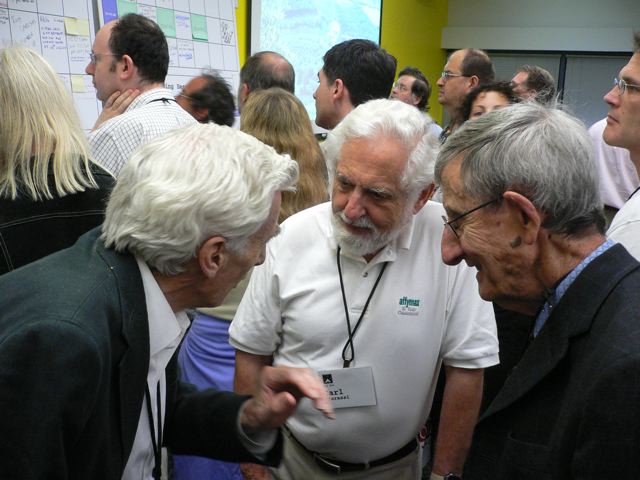
Lord Martin Rees, Carl Djerassi, Freeman Dyson
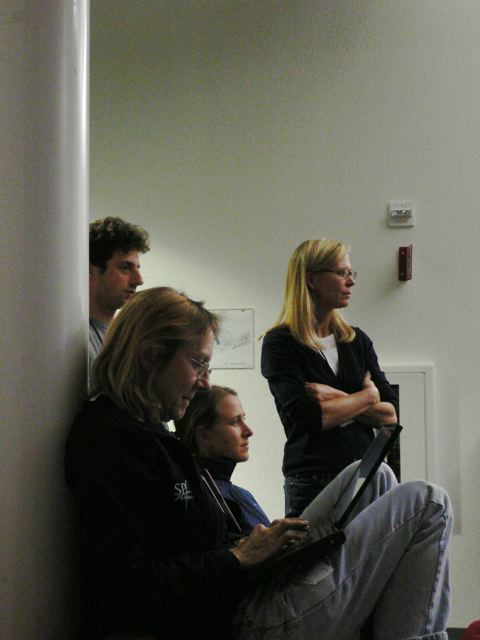
Sergey Brin, Esther Dyson, Anne Wojcicki, Linda Avey

Martha Stewart, Charles Simonyi
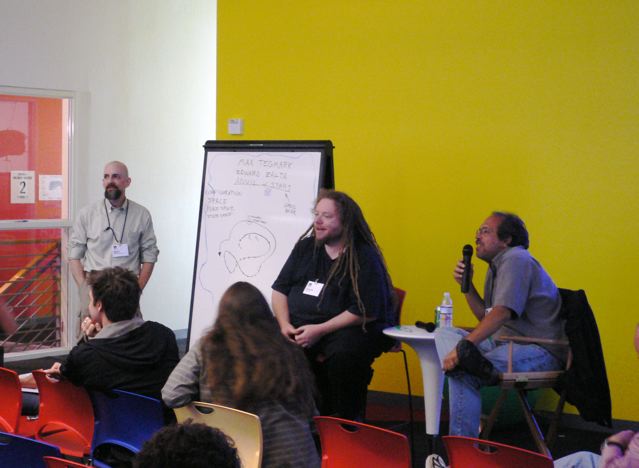
Neal Stephenson, Jaron Lanier, Lee Smolin. "The Nature of Time and Mathematics."
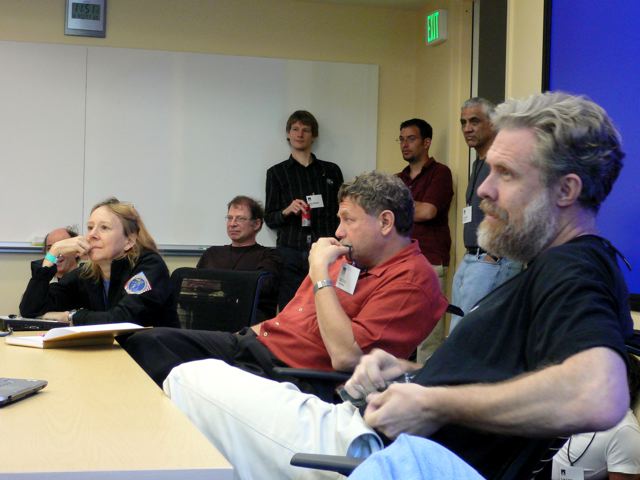
Esther Dyson, Eric Lander, George Church. "Sequencing the Genome: Implications, Ethics." (Vinod Kholsa in doorway)

Crowd Control
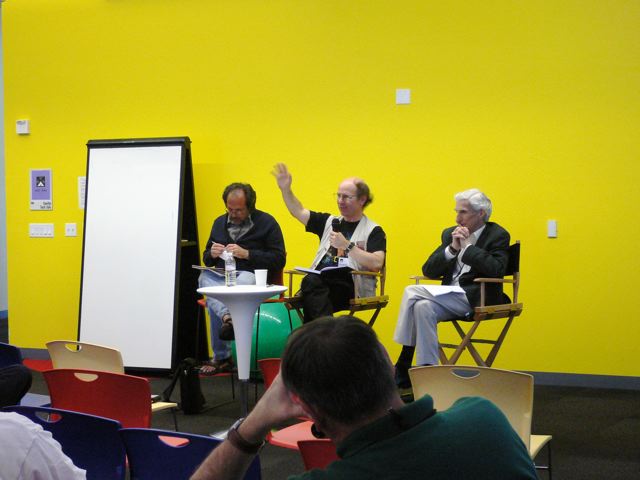
Lee Smolin, Frank Wilczek, Lord Martin Rees. "Universe or Multiverse?"
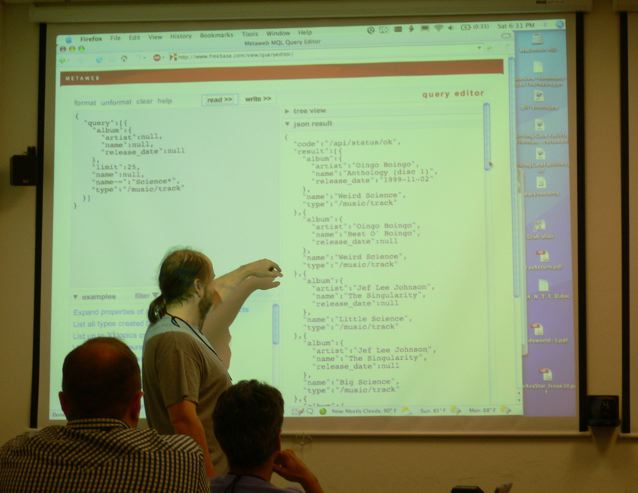
Danny Hilis. "Freebase demo"

Linda Stone, Jaron Lanier, Yossi Vardi, Freeman Dyson
(LINDA STONE:)
Among the highlights: "Visual Garage—We'll Fix Your Graphs and Visuals" with Felice Frankel and Stefan Sagmeister. The mix of disciplines—science, medicine, design—contributed to a dialog that offered useful insights. Had a great conversation with Felice afterwards on some representation challenges I'm addressing at the moment.
"Where are the Aliens" with David Grinspoon reminded us that many ideas we easily embrace today were initially considered heretical.
I was sorry to have missed George Dyson's session Godel and the Draft Board.
More? a few more physicists, a few more designers...
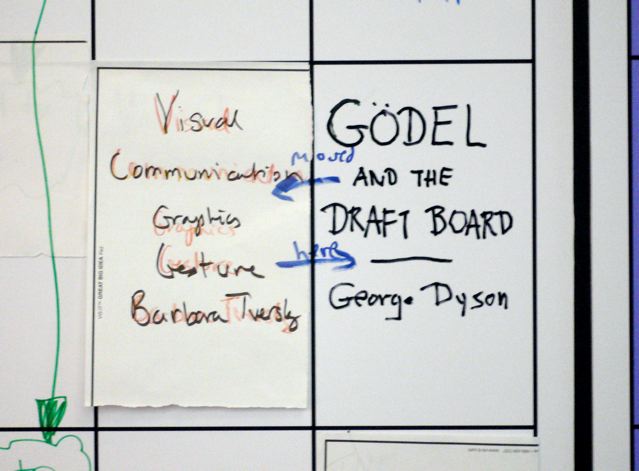
Schedule Board
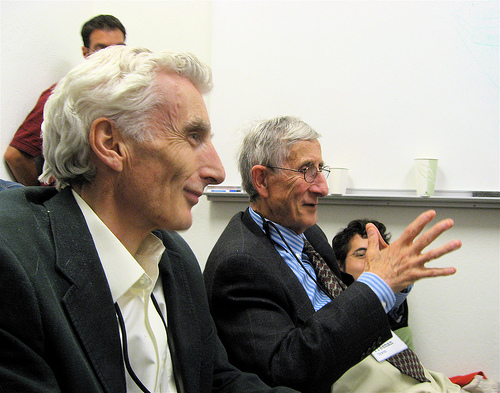
Photo by Steve Jurvetson
(STEVE JURVETSON:) Freeman Dyson added personal remembrances to a wonderful historical tale by George Dyson about Gödel’s difficulties with government bureaucracies while trying to return to Princeton from Austria during WWII… then trying to get his “enemy alien” designation removed…. and then getting promptly drafted. The series of absurd telegrams highlighted the inconsistency and incompleteness of the formal systems of law.
Lord Martin Rees smiles in the foreground.
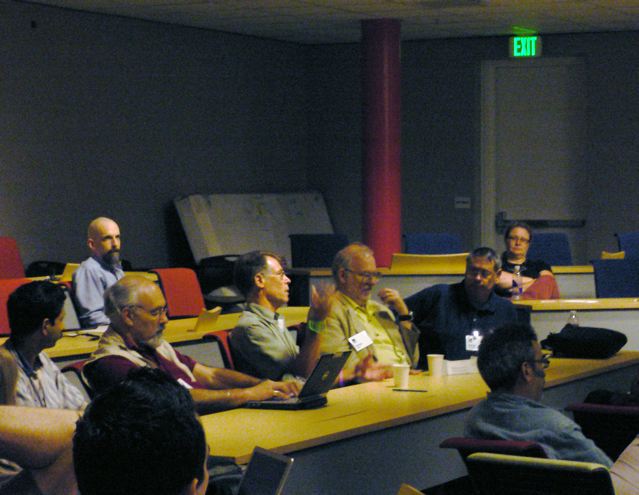
Neal Stephenson, Kim Stanley Robinson, Greg Bear, Oliver Morton et al. "Science fiction: what is it for? "
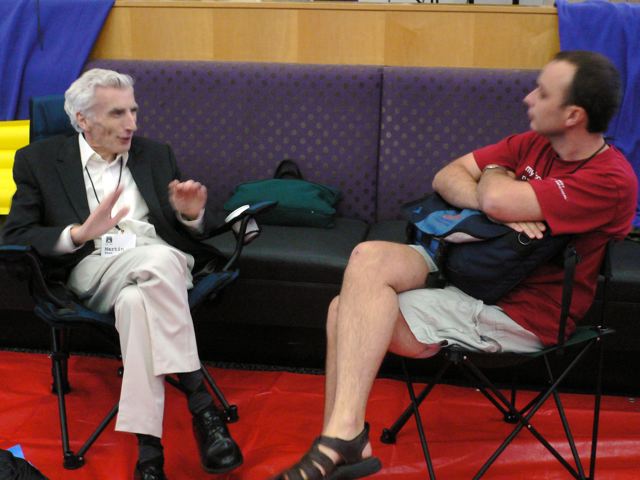
Lord Martin Rees, Nathan Torkington

